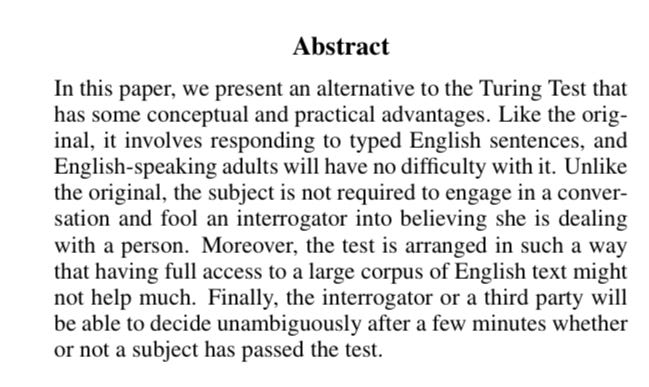Determinism and Literacy: False Coordination
I saw an article on the Apple newsfeed, popping up on my phone likely because I set a preference inside a setting inside the app. The article featured an interview with a biology professor from Stanford who wrote a book—imagine that. Retrieving the article is a fool’s errand; articles in these feeds disappear mysteriously. I can’t remember his name, though I recall his long, gray hair and zen like aura I believe standing near a fulsome office library. Or was it a Palo Altoish Japanese garden patio? Don’t talk to me about memory. It took me almost half a minute to remember ‘Rottweiler’ recently, working on a poem. I’m not as old as I used to be.
His expertise is chemistry. Although others will find it fascinating, I don’t believe this is a book I will read. Judging from the tone of his quotes, my sense is that he is not very happy with himself as the purveyor of truth about destiny, but somebody has to set the record straight. We have no free will. Science has proven conclusively that what we aspirationally refer to as ‘humanity’ is illusory, meaningless, metabolic, metaphorical. We have no other choice. We are simple chains of ancient chemical substances. We come. We go. All under remote control.
*****
Random is as random does. The letter that was slipped under the door and under the dusty rug, the pining for a lover for years and then, finally, getting the rug cleaned Faulkner-style; the wagon wheel on the dirt road that was shattered against a rock on the way to the hospital, the broken leg bleeding badly in the bed—Bruner’s possible worlds which may have not materialized had I would have only done, if we had only not have done….
*****
A few summers ago, I listened to all 25—or was it 27?—of John Searle’s lectures he delivered to his Philosophy of Mind students in the course he taught at UC Berkeley perhaps in 2013. The brilliance of his own mind was enough to capture my interest, but the substance was transformative. In addition to the generous portion of historical philosophical background Searle provided in his curmudgeonly fashion, begrudging the time lost from what he really wanted to talk about, the bulk of the course was explicating his own influential, seminal philosophy of mind played off of the scientific philosophers of artificial intelligence of the day. This was during the heyday of the Winograd Challenge. You’ll recall that this challenge is now an archaic test of the purity of AI in terms of human intelligence involving pronoun-antecedent relationships.
Searle didn’t comment specifically about the status of natural language algorithms, which were but nine years from the birth of ChatGPT, but he spoke at length about efforts to pit humans against machines in language games which have nothing to do with intelligence and its production of meaning in consciousness. Language, indeed, is a product of intelligence. The capacity to disentangle ambiguous pronoun references is not the capacity to act intelligently in a physical world where people are born and people die.
Determinism, of course, plays a determinative (sic) role in any philosophy of mind. Why did you think what you just thought? Did you think it freely? Did you have any choice in the matter? I have a vivid audio memory of the vivacious (sic) voice Searle turns on to evoke a scratch-your-head-quizzically moment in his lecture. “What difference does it make?,” he asks. “Who cares?” Then he composes a scenario at a French bistro when the waiter asks if you want red wine or white wine, and you say, ‘Well, don’t you know? You mean I have to tell you? Oh, never mind. Bring me whichever I’m supposed to have.’
*****
It just doesn’t work pragmatically to assume preordination. It doesn’t explain anything. Sure. Humans are links in a chain of ancient chemical substances with considerable shaping power. Tall people are inclined toward basketball. But humans are more than tall and basketball. Even their uses of language are not predetermined, all due apologies to the bot.
Humans prefer a certain type of wine, of bread, of company, and those preferences are communicated in word and in deed. The preference I entered into the app that sent me the article about the Zen professor who finally solved the existential puzzle gave me the opportunity to read it. I didn’t have to. I almost didn’t. My motivation to write about it in this post? Humans have durable dispositions created partly by destiny, partly by inclination.
The assumption of determinism is dehumanizing. In my view, the SoR ©️ pedagogical ideology enacted in legislation in 47 states is rooted in a naive perspective on determinism. At a macro level, its narrative takes the simple view. Children are widgets, teachers are technicians, wind them up, assign them readings, watch as the high school graduates transition to college or career and a happy life.
But children are not widgets, their bodies are not machines. Programming them in mind-numbing fashion from scripts and carefully walling off meaning from literacy at the start are dehumanizing in that these actions presume to know what children will think before they think it.





